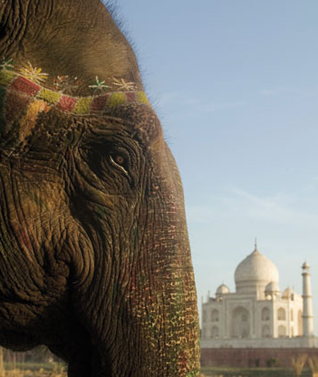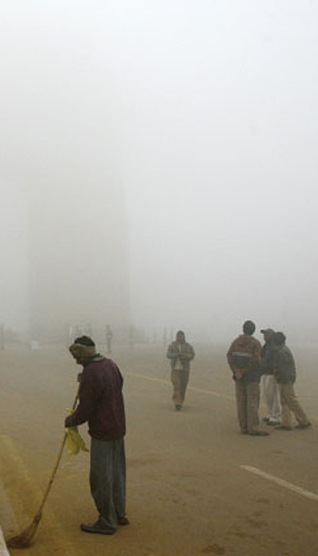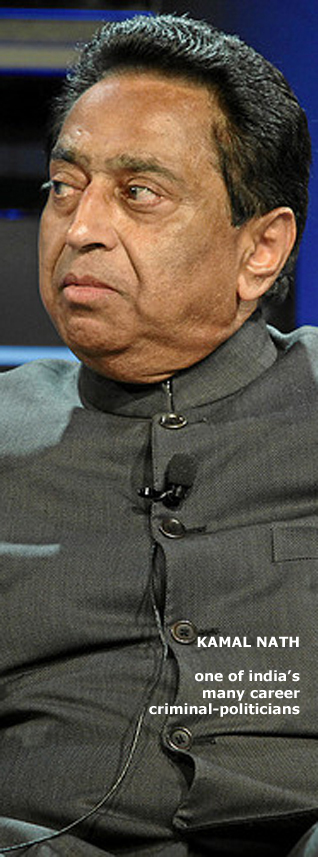Current Events
The Elephant In The Room:
The Rogue Nation of Asia
by BARBARA CROSSETTE
Think for a moment about which countries cause the most global consternation.
Afghanistan. Iran. Venezuela. North Korea. Pakistan. Perhaps rising China.
But India?
Surely not.
In the popular imagination, the world's largest democracy evokes Gandhi, Bollywood, and chicken tikka.
In reality, however, it's India that often gives global governance the biggest headache.
Of course, India gets marvelous press. Feature stories from there typically bring to life Internet entrepreneurs, hospitality industry pioneers, and gurus keeping spiritual traditions alive while lovingly bridging Eastern and Western cultures.
But something is left out of the cheery picture.
For all its business acumen and the extraordinary creativity unleashed in the service of growth, today's India is an international adolescent, a country of outsize ambition but anemic influence. India's colorful, stubborn loquaciousness, so enchanting on a personal level, turns out to be anything but when it comes to the country's international relations. On crucial matters of global concern, from climate change to multilateral trade, India all too often just says no.
India, first and foremost, believes that the world's rules don't apply to it.
Bucking an international trend since the Cold War, successive Indian governments have refused to sign nuclear testing and nonproliferation agreements - accelerating a nuclear arms race in South Asia. (India's second nuclear tests in 1998 led to Pakistan's decision to detonate its own nuclear weapons.)
Once the pious proponent of a nuclear-free world, New Delhi today maintains an attitude of "not now, not ever" when it comes to the 1968 Nuclear Non-Proliferation Treaty and the 1996 Comprehensive Test Ban Treaty. As defense analyst Matthew Hoey recently wrote in the Bulletin of the Atomic Scientists, "India's behavior has been comparable to other defiant nuclear states [and] will undoubtedly contribute to a deteriorating security environment in Asia."
Not only does India reject existing treaties, but it also deep-sixes international efforts to develop new ones.
In 2008, India single-handedly foiled the last Doha round of global trade talks, an effort to nail together a global deal that almost nobody loved, but one that would have benefited developing countries most. "I reject everything," declared Kamal Nath, then the Indian commerce and industry minister, after grueling days and sleepless nights of negotiations in Geneva in the summer of 2008. [Kamal Nath is accused of a personal involvement in the 1984 mass murders in India's capital, but has spent the last three decades ducking court dates and accountability through his political connections.]
On climate change, India has been no less intransigent.
In July, India's environment minister, Jairam Ramesh, pre-emptively told U.S. Secretary of State Hillary Clinton five months before the U.N. climate summit in Copenhagen that India, a fast-growing producer of greenhouse gases, would flat-out not accept binding carbon emissions targets.
India happily attacks individuals, as well as institutions and treaty talks.
As ex-World Bank staffers have revealed in interviews with Indian media, India worked behind the scenes to help push Paul Wolfowitz out of the World Bank presidency, not because his relationship with a female official caused a public furor, but because he had turned his attention to Indian corruption and fraud in the diversion of bank funds.
By the time a broad investigation had ended - and Robert Zoellick had become the new World Bank president - a whopping $600 million had been diverted, as the Wall Street Journal reported, from projects that would have served the Indian poor through malaria, tuberculosis, HIV/AIDS, and drug-quality improvement programs.
Calling the level of fraud "unacceptable," Zoellick later sent a flock of officials to New Delhi to work with the Indian government in investigating the accounts. In a 2009 interview with the weekly India Abroad, former bank employee Steve Berkman said the level of corruption among Indian officials was "no different than what I've seen in Africa and other places."
India certainly affords its citizens more freedoms than China, but it is hardly a liberal democratic paradise.
India limits outside assistance to nongovernmental organizations and most educational institutions. It restricts the work of foreign scholars (and sometimes journalists) and bans books. Last fall, India refused to allow Bangladeshi and Sri Lankan journalists to attend a workshop on environmental journalism.
India also regularly refuses visas for international rights advocates.
In 2003, India denied a visa to the head of Amnesty International, Irene Khan. Although no official reason was given, it was likely a punishment for Amnesty's critical stance on the government's handling of Hindu attacks that killed as many as 2,000 Muslims in Gujarat the previous year.
Most recently, a delegation from the U.S. Commission on International Religious Freedom, a congressionally mandated body, was denied Indian visas. In the past, the commission had called attention to attacks on both Muslims and Christians in India.
Nor does New Delhi stand up for freedom abroad. In the U.N. General Assembly and the U.N. Human Rights Council, India votes regularly with human rights offenders, international scofflaws, and enemies of democracy. Just last year, after Sri Lanka had pounded civilians held hostage by the Tamil Tigers and then rounded up survivors of the carnage and put them in holding camps that have drawn universal opprobrium, India joined China and Russia in subverting a human rights resolution suggesting a war crimes investigation and instead backed a move that seemed to congratulate the Sri Lankans.
David Malone, Canada's high commissioner in New Delhi from 2006 to 2008 and author of a forthcoming book, Does the Elephant Dance? Contemporary Indian Foreign Policy, says that, when it comes to global negotiations, "There's a certain style of Indian diplomacy that alienates debating partners, allies, and opponents."
And looking forward?
India craves a permanent seat on the U.N. Security Council, seeking greater authority in shaping the global agenda.
But not a small number of other countries wonder what India would do with that power.
Its petulant track record is the elephant in the room.
Barbara Crossette, a former New Delhi bureau chief for the New York Times, is author of "So Close to Heaven: The Vanishing Buddhist Kingdoms of the Himalayas".
[Courtesy: Foreign Policy]
April 4, 2012
Conversation about this article
1: Harnek Kaur (New Delhi, India), April 04, 2012, 8:09 AM.
Affluent nation, my foot! Just look at the photo you have posted of our "great goonda" Cabinet Minister, Kamal Nath. If I recognize it correctly, it was taken in Switzerland not too long ago, where he was representing our country at the Davos conference. Look at his borrowed jacket, probably taken from an aide to cover his usual banain and dhoti! We in India are undergoing the rule of yet another Slave Dynasty, except this one - unlike the earlier ones - has no glory, only uncouth bhoots in seats of power. Mercifully, this too shall pass.
2: John Barrow (Liverpool, United Kingdom), April 04, 2012, 8:22 AM.
India's big excuse up till now has been that it was poor. But now, with all the money in the world, why do they look like the "village idiot" of the world, and keep on sliding down every gauge that measures real progress?
3: Baldev Singh (Bradford, United Kingdom), April 04, 2012, 2:58 PM.
The rulers of India have turned India in the recent decades into a gigantic 'human torture chamber' and, of course, a vast, open toilet!
4: Tejinder Singh (London, United Kingdom), April 04, 2012, 3:52 PM.
India portrays itself to the outside world as if it is a true democracy and that it is a defender of human rghts around the world, but its double standards towards its own citizens is appalling. Indian security forces illegally killed thousands of Sikhs in the 1980s and 1990s. Human Rights activist Jaswant Singh Khalra's investigations demonstrated that Sikhs had been abducted by the police, killed in custody and then secretly cremated as "unidentified/unclaimed" bodies at various cremation grounds in Punjab.
5: H.S. Vachoa (U.S.A.), April 04, 2012, 5:11 PM.
Excellent article!
6: Baldev Singh (Bradford, United Kingdom), April 04, 2012, 6:01 PM.
Why doesn't America and the U.K. impose sanctions or condemn the systemic torture and murder of Indian citizens by Indian authorities? Answer: Because it has no oil for the taking! And because these idiots in India import more arms than any other country on Earth!
7: Sangat Singh (Kuala Lumpur, Malaysia), April 04, 2012, 7:13 PM.
Guru Nanak encapsulates this otherwise excellent essay in his famous hymn for Sajjan Thug: "ujjal kaihaa chilkanaa ghotim kaalrhee mas/ dhoti-aa jooth na utrai jay sa-o dhovaaa tis" - 'Bronze is bright and shiney, but when it is rubbed, its blackness appears. Washing it, its impurity is not removed, even if it is washed a hundred times." A parallel description of India yesterday and today. The feigned saintliness and air of humility, the half-closed eyes of false piety of the heron, are to be avoided at all costs. "Mooh mein Raam, bagal mai chhuri!"
8: Ankit (Delhi, India), April 05, 2012, 3:11 AM.
Thank you ... I appreciate this most informative article.
9: G.C. Singh (U.S.A.), April 05, 2012, 1:44 PM.
Perhaps this is a rare occasion when the media has exposed India's double standards in international affairs. The world has largely ignored the fact that India, while wearing the veil of Gandhian non-violence and so called democracy, is perhaps the most corrupt, unethical and violent country in the world. Through its propaganda networks, it has effectively hidden the genocide of innocent Sikhs and the gross human rights abuses it regularly inflicts on its minorities, women, children and the poor. It is about time that United States and other countries should end nuclear co-operation with India because the uranium shipped to India will most likely be converted to weapons of mass destruction. All outsourcing to India must also be stopped because the foreign exchange earned is being used to make India the biggest importer of arms, while a majority - yes, majority - of its population does not even have toilets and running water. All aid to India must be cut off because it is mostly siphoned off by corrupt politicians and bureaucrats who by some estimates have already stashed 1.5 trillion dollars in foreign banks.






